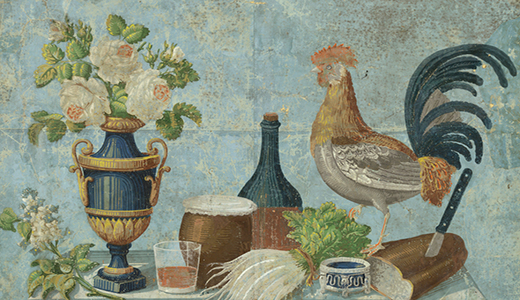 2020
2020
Overdoor, France, c. 1825. Cooper Hewitt, Smithsonian Design Museum, gift of Eleanor and Sarah Hewitt.
This August in the small town of Castiraga Vidardo, a rooster named Carlino, described in his local paper, Il Cittadino, as an “unconscious protagonist,” was fined 166 euros after the local police determined that his early morning crowing violated an order stating that a household pet must maintain a minimum distance of ten meters from neighborhood houses. The fine was delivered to eighty-three-year-old Angelo Boletti, who had kept Carlino for ten years in his garden. Earlier in the year, after facing a slew of neighborly complaints, Boletti handed Carlino over to a friend, but Carlino was given back to Boletti for twenty days while the new owner was on vacation. During these twenty days, neighbors reportedly staged a protest and filed numerous complaints as the rooster would awake them once more between the hours of 4:30 am and 6:00 am each morning. Boletti tells Il Cittadino that he will take the matter to the police and the prefecture before giving up and has his own complaints to file regarding his neighbor’s hedges and irregular parking spaces. Carlino, for now, remains happily in Boletti’s yard. The town, meanwhile, remains displeased. The mayor of Viardo, Emma Perfetti told Il Cittadino:
We have been forced to act in this way. We have applied the municipal regulation of urban police, in the face of numerous complaints from neighbors. The first inspection by the local police dates back to early July, when the man who could not keep the rooster was challenged because he did not comply with the ten-meter distance.
The man said he would only be there for twenty days and the local police officer, in the face of numerous other reports, intervened again well beyond those twenty days and the regulation was applied. It is not possible to wake up half a neighborhood at 4:30 in the morning.
 1474
1474
Illustration from Robert Chambers’ The Book of Days, 1869.
In the 1869 work The Book of Days: A Miscellany of Popular Antiquities, Robert Chambers present the stories of several animals accused of nefarious deeds. In the Swiss farming town of Lavigny, a sow with six young piglets were taken to trial after a five-year-old boy was found dead and partially eaten by them. During the trial, it was argued that the piglets were too young to have committed, or at least to have known they were committing, such a violent crime. The young pigs were acquitted, but their mother was condemned to death, her official court statement reading that she was to be “hanged by the hind feet to a gallows-tree.” Yet the young piglets were brought back to the court a month later when their owner “openly repudiated them and refused to be answerable in any way for their future good conduct.” The piglets were then declared vacant property and forfeited to the Lady of Savigny, who likely featured them in her annual February feast. Of the above illustration of the trial, Chambers notes, “Our artist has endeavored to represent this scene; but we fear that his sense of the ludicrous has incapacitated him for giving it with the due solemnity.” Another story featured a rooster accused of working with Satan.
In 1474 a cock was tried for having laid an egg. For the prosecution it was proved that cocks’ eggs were of inestimable value for mixing in certain magical preparations; that a sorcerer would rather possess a cock’s egg than be master of the philosopher’s stone; and that, in pagan lands, Satan employed witches to hatch such eggs, from which proceeded animals most injurious to all of the Christian faith and race. The advocate for the defense admitted the facts of the case, but asked what evil animus had been proved against his client, what injury to man or beast had it effected? Besides, the laying of the egg was an involuntary act, and as such, not punishable by law. If the crime of sorcery were imputed, the cock was innocent; for there was no instance on record of Satan ever having made a compact with one of the brute creation.